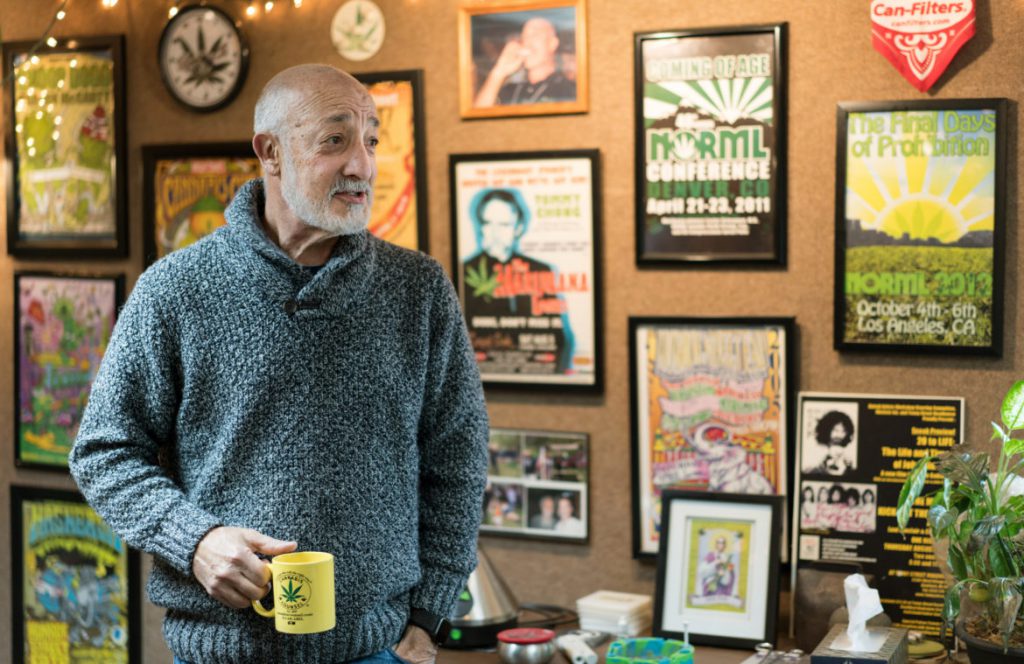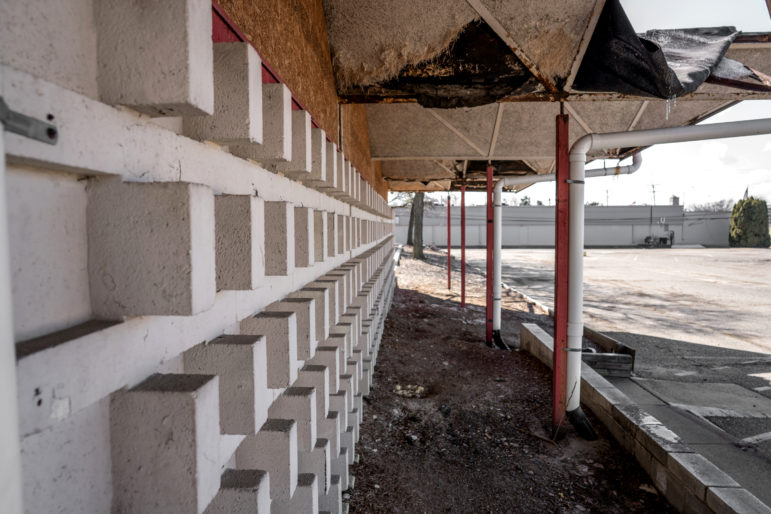Michigan Struggles With Legal Pot
Recreational marijuana legalized, but state struggles with how to regulate retail sales, other issues.

Attorney Matthew Abel is one of Michigan’s top marijuana advocates who founded the Cannabis Counsel law group in Detroit. Abel says the state’s legalization of marijuana in 2018 for recreational use is good for people and the economy. “It’s an opportunity to do a lot of good work all at the same time,” he says. Photo taken March 18, 2019. Photo by Viktor Tollemar for Wisconsin Watch.
Matthew Abel’s law firm bank account was shut down twice. He had to temporarily change the name of his Detroit firm from Cannabis Counsel to the generic Rivertown, PLC.
John Sinclair, a “radical poet” and national symbol of marijuana injustice, was sentenced to 10 years in prison in 1969 after passing two joints to an undercover narcotics officer.
Sinclair’s arrest and sentencing generated a public outcry by local residents and celebrities — even inspiring a John Lennon song named after him. In 1972, the Michigan Supreme Court ordered Sinclair’s release, in part by finding Michigan had violated the state constitution by “irrationally” classifying marijuana as a hard drug.
And over 200,000 people — most of them African American — were arrested between 2007 and 2016 because of marijuana.
These are some of the stories of Michigan’s pot prohibition era.
Cannabis limbo in Michigan

This poster advertises the star-studded Dec. 10, 1971, concert and rally for John Sinclair, a Michigan man arrested and sentenced to 10 years in prison for possessing two marijuana cigarettes. In 1972, the Michigan Supreme Court ordered Sinclair’s release, in part by finding Michigan had violated the state constitution by “irrationally” classifying marijuana as a hard drug. Last year, the state legalized recreational marijuana.
On Dec. 6, 2018, that era officially ended. Michigan became the first among its Midwestern neighbors to legalize recreational marijuana use. Proposal 1, a statewide ballot initiative propelled forward by signatures of some 360,000 Michiganders, passed with 56% of voters checking the “yes” box. Illinois also is moving toward full legalization in 2020.
While marijuana prohibition in Michigan is over, limbo has arrived.
Tom Ivacko, a researcher on all things policy-related in Michigan, described 2019 as a “haze” as officials scrapped one process for regulating marijuana and are implementing a new one before recreational cannabis hits the streets legally, probably in 2020.
The double entendre is an apt descriptor: unclear or obscure, with limited visibility for what lies ahead.
Proposal 1 allots 2019 to figure out the regulations that will govern an industry that is projected to bring in $134.5 million a year in taxes by 2023.
Despite legalizing medical marijuana 10 years ago, Michigan has not yet figured out how to successfully regulate it, said Ivacko, associate director of the University of Michigan’s Center for Local, State and Urban Policy (CLOSUP).
Ivacko called the existing regulation of medical marijuana “complicated and confusing.” He credited newly elected Gov. Gretchen Whitmer, a Democrat, with abolishing the existing medical marijuana licensing board and creating a new marijuana regulatory agency that will handle both recreational and medical cannabis in Michigan.
“So while the mess on the medical side is still playing out … it appears things are now at least heading in the right direction,” he said.
Because of Proposal 1, marijuana use, both recreational and medicinal, is currently legal for users age 21 and older in Michigan. Possession of 2.5 ounces of marijuana and growing up to 12 marijuana plants in a single residence is also permitted.

Wisconsin Watch reporter Rachelle Wilson arranged the sale of a “book bundle” from BlazeMichigan, a Michigan business that sprung up after state voters legalized recreational marijuana in 2018. Sales are still banned, but enterprising entrepreneurs have devised ways to “gift” marijuana. In this case, edibles including a brownie, a marshmallow treat and gummies containing cannabis came free with the purchase of two used books for $65. Photo by Rachelle Wilson / Wisconsin Watch.
While recreational sales are temporarily illegal, gifting marijuana is not — a loophole that entrepreneurs have been quick to capitalize on.
A couple opened a bookstore BlazeMichigan, with locations in Whitmore Lake and Coldwater, where they sell books and gift marijuana. One “book bundle” buys you two used books for $65 with four edibles for free. A college student, Marc Bernard, opened Smoke’s Chocolate in his apartment in Ann Arbor, selling chocolates that come with a free side of marijuana. No sale of marijuana, no law broken.
Local control rules

Wisconsin Watch reporter Rachelle Wilson arranged the sale, via text message, of a “book bundle” from BlazeMichigan, a business that sprung up in Michigan after state voters legalized recreational marijuana in 2018. Sales are still banned, but enterprising entrepreneurs have devised ways to “gift” marijuana. In this case, edibles including a brownie, a marshmallow treat and gummies containing cannabis came free with the purchase of two used books for $65. Photo by Rachelle Wilson / Wisconsin Watch.
A central feature of Proposal 1 is that municipalities have the choice to opt out of allowing marijuana retail stores to set up shop in their jurisdictions next year. Cities have an incentive to opt in, though: Only those municipalities that opt in are eligible for a cut of the state revenue from marijuana sales.
But even in municipalities where voters favored legalization, this has not translated into those communities opting in.
After doing a “little bit of digging” into the data from CLOSUP, Ivacko says he was surprised at how many jurisdictions opted out where voters approved the proposal.
In January, he calculated that of the jurisdictions that had opted out, about half were within municipalities where the majority of citizens had voted to approve legalization. As of mid-March, nearly 300 municipalities had opted out of allowing recreational marijuana sales, according to WXYZ, the ABC news affiliate in Detroit.
Because marijuana use and sales continue to be banned federally, he said the lack of consistency could place local law enforcement in a difficult position.
“If a chief of police or county sheriff feels it’s important to follow federal law, and a county administrator or a city mayor feels it’s important to follow state law, well, that’s a tough place to be for public officials,” Ivacko said. “And so, opting out, you know, is a way to avoid those kinds of challenges.”
Nationwide, 33 states plus the District of Columbia have legalized medical marijuana; recreational marijuana use is or will be legal in 11 states plus D.C., and 24 have decriminalized or reduced consequences for minor possession.
Fears lead to opting out

Attorney Matthew Abel has been advocating for legalization of recreational marijuana in Michigan for years. His law practice, Cannabis Counsel, specializes in defending clients accused of marijuana-related offenses and helping businesses navigate marijuana laws. He is seen here in his Detroit law office on March 18, 2019. Photo by Viktor Tollemar for Wisconsin Watch.
Matthew Abel offers a few explanations for why a municipality might opt out. Abel, founder of the Cannabis Counsel law group in Detroit, is the state’s top legalization advocate, serving leadership roles in several pro-marijuana organizations. He has been using cannabis himself for over 45 years, with one arrest for possession.
Supporting marijuana legalization broadly and supporting sales in your community or neighborhood are different questions, he said.
“Just because they (residents) voted for legalization, doesn’t mean they support stores,” he said. “Maybe they just want personal freedom, and you know, we want people to not get busted for it, but that doesn’t mean that we want people to be able to sell.”
Another possibility, he said, is that municipalities may want to opt out temporarily while they wait to see how it plays out elsewhere. City officials from Royal Oak, Livonia and Houghton have been quoted in the media using the same phrase — “wild west” — to describe the impending legalization.
Abel believes this cautionary tactic is unnecessary based on other states’ experiences.
“Well the statistics are showing from states like Colorado that access to cannabis, not just having it legal, but having dispensaries where people can go and purchase the product makes the community more vibrant economically,” he said. “There’s less domestic violence, less driving under the influence of alcohol, fewer overdoses and deaths from opiates.”
Added Abel: “It’s an opportunity to do a lot of good work all at the same time.”
A town that opted in

Brian Hartwell, mayor of Madison Heights, Mich., says the city hopes to take “the 14 ugliest, most derelict industrial sites in our city” and turn them into licensed marijuana businesses. Hartwell says the recent legalization of recreational marijuana in Michigan could become a boon to his blue-collar community. Photo courtesy of Brian Hartwell.
A few communities over from Matthew Abel’s law office is a blue-collar city that has opted in.
Mayor Brian Hartwell of Madison Heights said his town’s vote of support “starts from a very compassionate place.”
One-third of the 30,000 residents of his city are current or retired union auto workers, the mayor said, many with bodies worn down from years of factory work. “We have to be one of the hardest working places in America,” Hartwell said.
A lot of these workers, including many retirees, are marijuana patients who would benefit from having local access to their medicine, he said.
“Our workers — if their doctors say they can derive relief from medical marijuana — I do not judge the doctors or the patients,” Hartwell said.
Madison Heights plans to award permits for 14 medical marijuana businesses to open in the city’s industrial districts.
A 200-point scoring system is being used to choose the businesses from among the “dozens and dozens” of applications he is expecting. The largest number of points are awarded to the applicant that proposes the largest financial investment in Madison Heights, he said.
The city’s goal is to take “the 14 ugliest, most derelict industrial sites in our city” and turn them into licensed marijuana businesses, Hartwell said. He mentioned a particularly dilapidated site that he hopes will be converted.

The city of Madison Heights, Mich., hopes to turn this dilapidated former bowling alley into a marijuana dispensary. The site has long been a menace to the city. In 2011, the FBI busted a prostitution ring being run from private party rooms inside. Madison Heights was among the communities opting to allow retail marijuana sales after voters legalized recreational marijuana in a 2018 ballot initiative. Photo taken March 18, 2019. Photo by Viktor Tollemar for Wisconsin Watch.
“There is a bowling alley that has been closed in Madison Heights for many years. A tree has fallen on it, the roof has caved in, it’s, like, the most dangerous site in the city,” Hartwell said. “And it’s not even worth $10. However, it’s zoned industrial. So, overnight, there’s become a bidding war in the millions of dollars for this disgusting, dangerous piece of land.”
The site has long been a menace to the city. Back in 2011, the FBI busted a prostitution ring being run from the private party rooms of Fairlanes Bowl.
The intent of Madison Heights’ approach is to provide physical and economic rehabilitation to medical marijuana patients — and the city.
Voters, officials differ on support

Wisconsin Watch reporter Rachelle Wilson purchased two books for $65 from BlazeMichigan, a business that sprung up after state voters legalized recreational marijuana in 2018. She received two random used books, as well as a “gift” of edibles including a brownie, a marshmallow treat and gummies containing cannabis for $65. Photo by Rachelle Wilson / Wisconsin Watch.
Two-thirds of Madison Heights’ voters favored recreational marijuana. The City Council opted in, approving licensed marijuana businesses, by a 4-3 vote. According to Hartwell, one of the four council members who voted “yes” had been waffling on legalization for years, but ultimately came around after seeing the community’s vote in favor.
“It’s a very clear mandate,” Hartwell said. “It can’t get any clearer that that, the voters saying, ‘We read this, and we want this.’ If I’m surely a representative, then I must — I must — accept recreational marijuana as soon as the state regulations are issued.”
But there remains a gap between elected officials and public will when it comes to marijuana in Michigan.
In spring of 2018, just a few months before Proposal 1 passed in Michigan, a CLOSUP survey revealed that just 21% of local officials favored recreational legalization. Yet 61% of Michigan residents told the survey they planned to vote yes to a legalization initiative — a huge mismatch.
Echoes in Wisconsin
A similar struggle is underway in Wisconsin, where 59% of residents say they support broad legalization of marijuana.
Gov. Tony Evers has proposed legalizing medical marijuana, decriminalizing possession of small amounts of cannabis and expungement of past marijuana convictions. The Democratic governor also has said he would support a popular referendum on recreational marijuana. But Republican leaders who control the Legislature have said they oppose legalizing recreational marijuana, and they are split on medical marijuana.
Voters in Wisconsin cannot place binding measures on the ballot, so legalization advocates here lack a clear way of compelling lawmakers to act.
One of the Legislature’s top marijuana advocates, Rep. Melissa Sargent, D-Madison, has introduced a bill calling for full legalization. It includes opt-out measures for municipalities.
“These provisions are important to local governments and many advocates, as they allow for local control and decision-making rather than an absolute mandate from the state,” she said.
This story was produced as part of an investigative reporting class at the University of Wisconsin-Madison School of Journalism and Mass Communication under the direction of Dee J. Hall, Wisconsin Watch’s managing editor. Wisconsin Watch’s collaborations with journalism students are funded in part by the Ira and Ineva Reilly Baldwin Wisconsin Idea Endowment at UW-Madison. The nonprofit Wisconsin Watch (www.WisconsinWatch.org) collaborates with Wisconsin Public Radio, Wisconsin Public Television, other news media and the UW-Madison School of Journalism and Mass Communication. All works created, published, posted or disseminated by Wisconsin Watch do not necessarily reflect the views or opinions of UW-Madison or any of its affiliates.
More about the Legalizing of Marijuana
- Wisconsin Voters Back Legal Weed, Lawmakers Still Say No - Anya van Wagtendonk - Feb 12th, 2026
- Wisconsin Lawmakers and Hemp Producers Both Want New Regulations on THC - Lorin Cox - Oct 7th, 2025
- Hesselbein Will Revive Medical Marijuana Bill - Anya van Wagtendonk - Dec 16th, 2024
- Data Wonk: Will State Move to Legalize Marijuana? - Bruce Thompson - Sep 25th, 2024
- Data Wonk: Should Wisconsin Legalize Marijuana? - Bruce Thompson - Sep 18th, 2024
- Indigenous-Led Campaign Launches to Support Medical Marijuana - Isiah Holmes - Sep 4th, 2024
- How Delta-8 Impacts Marijuana Debate in Wisconsin - Richelle Wilson - Jun 18th, 2024
- Milwaukee Officials Praise Rescheduling of Cannabis by Biden - Isiah Holmes - May 20th, 2024
- What Will Wisconsin Do Now That Feds Are Moving to Ease Marijuana Restrictions? - Rich Kremer - May 2nd, 2024
- A Better Wisconsin Together Renews Call for Cannabis Legalization - A Better Wisconsin Together - Apr 20th, 2024
Read more about Legalizing of Marijuana here
-
Legislators Agree on Postpartum Medicaid Expansion
 Jan 22nd, 2025 by Hallie Claflin
Jan 22nd, 2025 by Hallie Claflin
-
Inferior Care Feared As Counties Privatize Nursing Homes
 Dec 15th, 2024 by Addie Costello
Dec 15th, 2024 by Addie Costello
-
Wisconsin Lacks Clear System for Tracking Police Caught Lying
 May 9th, 2024 by Jacob Resneck
May 9th, 2024 by Jacob Resneck





















